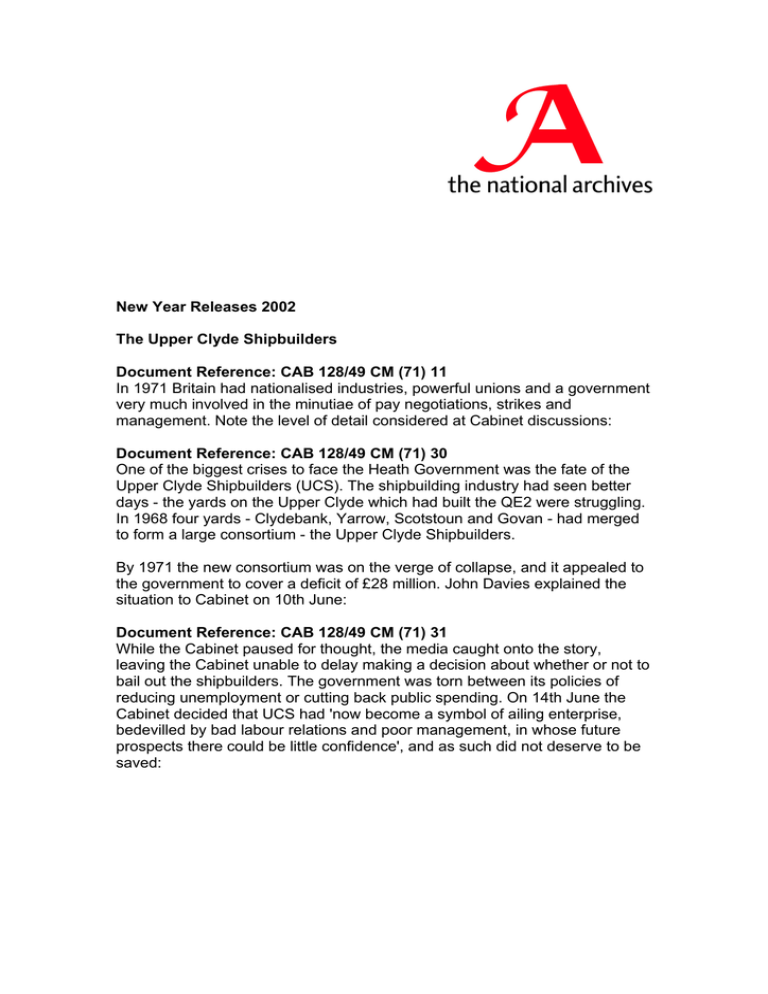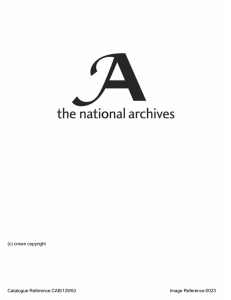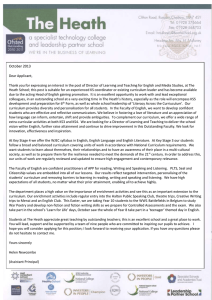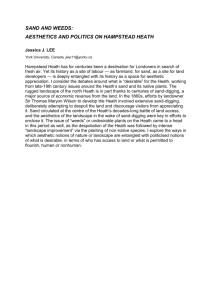New Year Releases 2002 The Upper Clyde Shipbuilders
advertisement

New Year Releases 2002 The Upper Clyde Shipbuilders Document Reference: CAB 128/49 CM (71) 11 In 1971 Britain had nationalised industries, powerful unions and a government very much involved in the minutiae of pay negotiations, strikes and management. Note the level of detail considered at Cabinet discussions: Document Reference: CAB 128/49 CM (71) 30 One of the biggest crises to face the Heath Government was the fate of the Upper Clyde Shipbuilders (UCS). The shipbuilding industry had seen better days - the yards on the Upper Clyde which had built the QE2 were struggling. In 1968 four yards - Clydebank, Yarrow, Scotstoun and Govan - had merged to form a large consortium - the Upper Clyde Shipbuilders. By 1971 the new consortium was on the verge of collapse, and it appealed to the government to cover a deficit of £28 million. John Davies explained the situation to Cabinet on 10th June: Document Reference: CAB 128/49 CM (71) 31 While the Cabinet paused for thought, the media caught onto the story, leaving the Cabinet unable to delay making a decision about whether or not to bail out the shipbuilders. The government was torn between its policies of reducing unemployment or cutting back public spending. On 14th June the Cabinet decided that UCS had 'now become a symbol of ailing enterprise, bedevilled by bad labour relations and poor management, in whose future prospects there could be little confidence', and as such did not deserve to be saved: Document Reference: PREM 15/697 An advisory group was set up under Lord Robens to see whether anything could be salvaged when the consortium went into liquidation. But UCS was not going to fold away quietly. The very next day, the shop stewards were outspoken in their demands that the government should intervene to save their jobs, and determined to see the Prime Minister himself. Heath himself expressed willingness to meet them, but the advice from the Secretary of State for Trade and Industry was that responding to such demands would be very out of the ordinary: Document Reference: PREM 15/697 Heath decided to meet the shopstewards and received them on the 16th June. The Prime Minister repeated his refusal to intervene to rescue the yards. A Note for the Record recounts the occasion: Document Reference: PREM 15/697 Five days later he invited a deputation from the Scottish Trade Union Congress to Downing Street. Note how clear Heath was about the government policy not to support 'lame duck' industries: 'it is not a basis in which the country can be run to pour money into debt-making companies. There is no future except in companies which can build ships and sell them at a profit. UCS has not been a success and there is no point in endeavouring to keep it alive': Document Reference: PREM 15/697 The advisory group appointed to look into the matter reported in July that 'Some twenty million pounds of public money has been spent. This has totally disappeared, no improvements in facilities have been achieved, no worthwhile investment has been made.' It concludes by recommending 'that an end be made to UCS in a way that establishes beyond doubt its failure': Document Reference: PREM 15 / 604 dated 30th July On the 29th July the Trade and Industry Secretary John Davies made a statement to the House of Commons, confirming liquidation. The workers at Upper Clyde responded with a 'work in' led by Communist shop steward Jimmy Reid. Instead of striking they took over the yards and continued to work. This won them considerable popular support and sympathy. An emergency debate was called. But Heath was away sailing his boat 'Morning Cloud' for the first race of Cowes Week. His principal private secretary, Robert Armstrong, was convinced he should come home - and desperately tried to contact him to tell him to return. Note his worries about public sympathy: 'a mainstay of criticism is the government's heartlessness… the emotional argument for UCS is much more popular than the clinical economic analysis': Document Reference: CAB 129/158 CP (71) 99 At the heart of the debate about the Upper Clyde Shipbuilders was a debate within the Conservative party about which way Conservative philosophy should develop. This comes through in a Cabinet Memorandum written by the government Think Tank - The Central Policy Review Staff - on 30th September, which says of UCS 'The government has emphasised its refusal to support lame ducks but… its style has sometimes appeared hard and unfeeling… does this point to the advantage of a less doctrinaire approach to intervention in the private sector': Document Reference: CAB 128/49 CM (71) 50 By mid-October the government position was looking more flexible. In Cabinet they talked about saving two or even three of the yards: Document Reference: CAB 129 / 159 CP (71) 126 Ultimately Heath's government decided that the social consequences of the 'lame duck' policy were too severe. Avoiding further unemployment was after all deemed to outweigh commercial viability. This change of heart is made clear in the Memorandum from the Secretary of State for Trade and Industry, John Davies, to Cabinet on the 2nd November: The rest of the story won't be seen until the files from 1972 are released - but we know that on 24th February 1972 the Cabinet was told that £35 million would be provided to save three of the four yards. This was the famous 'Uturn' that Margaret Thatcher referred to in her party conference speech of 1980, when she said that "this lady's not for turning". Who was right, you can judge for yourself from the documents. New Year Releases 2002 Oui! Britain Negotiates Entry into Europe Document Reference: CAB 164/ 918 In 1971 Britain successfully negotiated her way into Europe. For a decade, successive British governments had been in favour of entry to the European Economic Community, but their previous application had been turned down by a French 'Non!' from Charles de Gaulle. In 1971 it was recognised that the relations with the French were the key to success. In the documents from that year, there are files devoted to improving AngloFrench relations. Here the Permanent Undersecretary of State at the Foreign and Commonwealth Office, Sir Denis Greenhill, describes the task as 'uphill work': Document Reference: PREM 15/371 Sir Christopher Soames, the British Ambassador in Paris, kept the Foreign Office up to date on public opinion in France, and, crucially, on President Pompidou's attitude to Britain. In this letter to Sir Denis Greenhill, dated 21st April, he advocates a personal meeting between Edward Heath and the French President, because '… the French (from the President down) are waiting for us to make the move - partly no doubt for reasons of national pride, but also because nobody here seriously believes that the centuries-old hatchet of Anglo-French animosity can be buried by remote control in Brussels': Document Reference: PREM 15 / 374 So Heath paid an official visit to Paris from 19th - 21st May. He had eleven hours of tête-à-tête discussion with Pompidou. Sir Christopher Soames sent Foreign Secretary Sir Alec Douglas-Home a detailed description of what had taken place: Document Reference: CAB 128/49 CM (71) 27 Back home on Monday 24th May, Heath told the Cabinet how he felt the discussions had gone: Document Reference: CAB 128/49 CM (71) 36 The talks in Paris were considered a resounding success. The negotiations were duly completed in Luxembourg the following month. The next step was to convince the British Parliament to approve. The White Paper on British membership of the European Communities went through many drafts. Cabinet considered them carefully, discussing the importance of public presentation. In this minute from Thursday 1st July, they decide that part of the draft 'went too far in suggesting that we should never face a choice involving in some sense a sacrifice of national sovereignty': Document Reference: PREM 15 / 358 On 28th October the House of Commons voted, by 356 to 244, in favour of the United Kingdom joining the European Community. Edward Heath has called it his finest hour. Letters of congratulation poured in from around the world. Here are those to Heath from President Pompidou and President Nixon; but he also heard from Italy, Germany, Mauritius, Holland, Luxembourg, Lesotho, Yemen, Malaysia and others. New Year Releases 2002 Royal Visit from Afghanistan Document Reference: FCO 37/778 In 1971 the King of Afghanistan, Zahir Shah, came on a State Visit to the Britain. It was the first ceremonial visit from the Afghan royal family since 1929. Zahir Shah had been on the throne since 1933 and, although he was deposed and exiled in 1973, it is still he that has been in the headlines in 2001. Before he arrived, the Foreign and Commonwealth Office wrote personality notes describing the expected royal visitors: Document Reference: FCO 37 / 780 Historically, the relationship between Britain and Afghanistan had been stormy. The South Asian Department of the Foreign and Commonwealth Office wrote a background brief charting these relations, and considering which subjects might be too delicate for discussion at the banqueting table. Note the interesting consideration of Zahir Shah as a popular but reluctant and aloof leader: Document Reference: FCO 37 / 781 In the event, the visit went smoothly and was considered a success. Sir Alec Douglas-Home's speech for the luncheon given by the British government on December 8th 1971 was warm and humorous: New Year Releases 2002 Negotiating a settlement in Rhodesia Document Reference: CAB 129 / 155 CP (71) 2 During 1971 Britain tried hard to negotiate a settlement with Rhodesia. In 1965 Ian Smith had declared independence illegally to prevent a move to rule by its African majority. At the beginning of 1971, letters were exchanged between the Rhodesian Government and the British Ambassador about whether there was sufficient common ground to resume constitutional talks. This Cabinet Memorandum by the Foreign Secretary, Sir Alec Douglas-Home, shows that the British wanted to reach a settlement that would foster racial harmony through majority rule: Document Reference: PREM 15 / 622 Secret talks began, and the files reveal the detail and progress of several months of complicated negotiations in Rhodesia, conducted by the secret emissary Lord Goodman. It was so hushed that the Foreign Office spent a long time considering complicated plans to avoid detection - including code names and disguises (see PREM 15/621). The Foreign Secretary, Douglas-Home, did not want to go to Rhodesia to negotiate himself, until he was sure a settlement was a realistic possibility. As he wrote here in this memo to Heath, the worry was that the white minority leader, Ian Smith, would never compromise: "Whether he is in fact prepared to meet us on the apparently small but crucial issues which still divide us, I cannot tell, for he hates the idea of majority rule": Document Reference: CAB 129 / 159 CP (71) 127 There were "five principals" which the British government felt needed to be resolved to reach a satisfactory settlement. These are laid out clearly in the Memorandum presented to Cabinet. Note the difficulties over the land issues which still haunt modern Zimbabwe in 2002. Document Reference: PREM 15/ 625 It was a frustrating process, but Lord Goodman persevered. When he felt that they were near settlement, Douglas-Home flew to Rhodesia to complete the negotiations face to face with Smith. It was a tense time, and failure now would be embarrassing. The Foreign Secretary wrote to Edward Heath updating him on the situation on 21st November. He expressed his concern that "the line between the races has been hardening for six years" and that "From what I have said you will see that what is really needed in Rhodesia is a change of heart among Europeans. (The women are much the most hard-hearted!)". Responsibility weighs on his shoulders: "The Africans say to me that Britain is their protector. I have to say to them, sadly but firmly, that the role that they cast for us is not real, that we will use all the influence we can but it is running out fast." He ends on a note of hope "I hope that tomorrow we can get everything we want. If we have to break it will be on a clear issue but for Rhodesia it would be a tragic day": Document Reference: PREM 15 / 625 In fact it was not the next day, but the day after that, that agreement was reached. Douglas-Home sent this telegram announcing the news: By the 25th November, he was back in Westminster to tell the House of Commons the news: The files for 1971 end on this very positive note. But the following year in January the settlement was comprehensively rejected as unsatisfactory by the black majority, so the story was far from over. Document Reference: PREM 15/ 714 Heath's relationship with President Nixon was perhaps not the height of the 'Special Relationship' between Britain and the USA, but nevertheless, as the records show, they kept in touch This file shows how Heath was struck by the "fundamentally lonely" position of the American president - the most powerful man in the world. It is interesting in that it shows Heath considered himself as somebody with whom "he could conduct a genuine dialogue in a constant exchange of ideas, impressions, suggestions without any inhibition on either side": Document Reference: PREM 15 / 625 In this record of a telephone conversation between the two premiers in November 1971, they discuss a range of world affairs; from the impending crisis in East Pakistan (Bangladesh) - which was set to lead to a short war between India and Pakistan the following month; to the possibility of a settlement in Rhodesia; and the exchange of a little joke about Heath's passion for sailing: Document Reference: FCO 31 / 1072, dated July 2nd 1971 In January 1971, while President Obote was away at the Commonwealth conference in Singapore, Idi Amin seized power in Uganda. Amin, a 45-year old former army boxing champion, promised free elections, an early return to civilian rule and the release of all political prisoners held on "false or unspecified charges". Just one month later he had promoted himself to the rank of full General and appointed himself president. In July, the British were preparing for a State Visit from Idi Amin. The British Embassy at Kampala prepared personality notes and briefings for Heath and his government back home. They comment on his tastes (salmon), good looks and size (he'll need a special bed), and on the roving eye of his chief aide. At this stage, the verdict on Amin is a positive one, as a "popular natural leader of men" though "simple and practically illiterate": Document Reference: CAB 129/158 CP (71) 99 In 1971 Heath set up the Central Policy Review Staff, often called the 'Think Tank'. It was headed by Lord Rothschild - a maverick member of the famous banking family, brilliant biologist and sometime MI5 agent - whose character strongly infuses the tone of the CPRS meetings and reports. It was part of the official Whitehall machine, designed to bring high powered ideas and multidisciplined outsiders into the heart of government. The function of the CPRS was to give frank advice to Cabinet, and it did this by publishing a series of reports looking at specific issues. For example, you can see what they thought about Concorde on the 'Concorde story' pages of this site. Here, however, is a more general strategy review by the CPRS. Written at the end of September 1971, it looks at all areas of government policy. It is a fascinating overview of the year, and contains some interesting suggestions: note the implied 'third way' for conservatism of point 11 (iv); as well as some scathing assessments such as the comments on Northern Ireland as "the joker in the pack" at point 19.



